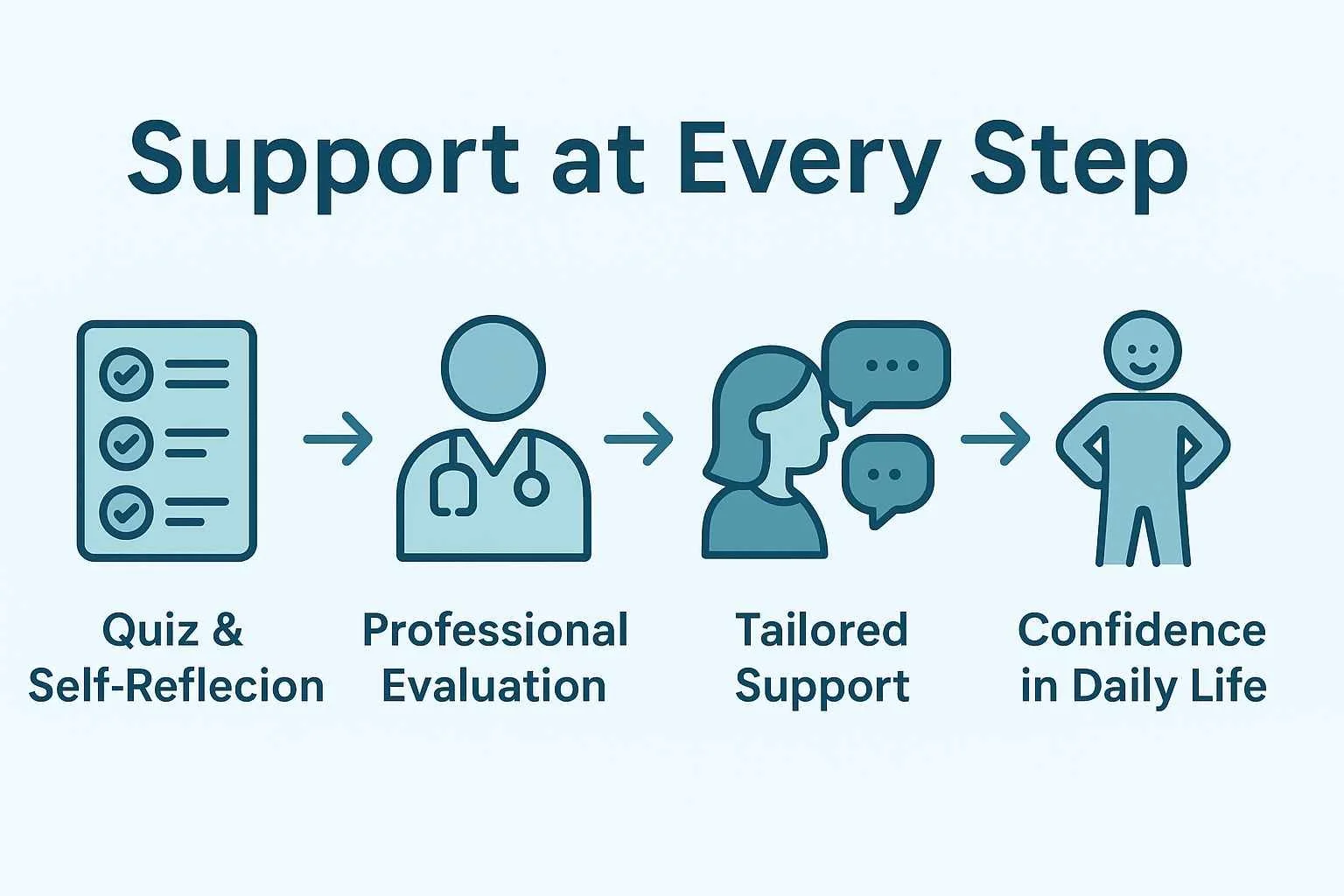Curious if You’re Neurodivergent? Try This Reflective Quiz
Many adults wonder if the way their brains work might be different from what is considered typical. If you’ve found yourself asking, “Am I neurodivergent?” you are not alone. Reflective quizzes can help you notice patterns in your experiences and begin a process of self-discovery and self-understanding.
Key Takeaways
Our neurodivergent quiz can highlight themes in your thinking, behavior, and social interactions. It is not a medical diagnosis, but it can be a first step in recognizing personal strengths and differences.
Neurodivergent traits vary widely and can include unique ways of focusing, processing sensory input, and communicating. Some people find that these experiences overlap with conditions such as autism or ADHD, though only a professional can confirm a diagnosis.
Speech-language pathologists and other specialists can support adults who want to better understand and celebrate their communication styles and develop strategies for environments that feel challenging.
What Does It Mean to Be Neurodivergent?
Common Symptoms and Neurodivergent Traits
Neurodivergent Conditions and Examples
Understanding the Value of Professional Evaluation
What Does It Mean to Be Neurodivergent?
The word “neurodivergent” is not a medical diagnosis but a social and cultural term used to describe individuals whose brain processes, learning, or behavior differ from what is often considered typical.
Neurodivergent people may think, feel, and interact with the world in diverse ways. A neurotypical individual has brain processes and communication styles considered typical, whereas neurodivergent people process the world in a slightly different way.
Neurodivergent examples include people with autism spectrum disorder, attention-deficit/hyperactivity disorder (ADHD), learning differences such as dyslexia, and other conditions like Tourette’s syndrome or sensory processing differences. Each of these may present challenges, but also strengths such as creativity, persistence, or innovative problem-solving.
Traits of neurodivergence vary widely, so no two experiences look exactly alike. Some neurodivergent individuals may feel overwhelmed easily in busy settings, exhibit high sensitivity to light, sound, or textures, or struggle with interpreting social cues. Others may display intense focus on specific interests, use repetition or physical movements for self-regulation, or approach problem-solving in unique ways.
These traits do not define limitations but instead reflect the many ways brains can work differently, offering fresh perspectives that enrich human diversity..
Neurodivergent Quiz
Am I Neurodivergent? A Self-Reflection Quiz
This quiz is designed to help you reflect on traits and experiences that are sometimes associated with neurodivergence, including ADHD, autism, or learning differences. It is not a diagnostic tool, but it can offer insight into patterns you may recognize in yourself and provide language to better understand your experiences.
Instructions: Read each question carefully and take a moment to consider the short explanation beneath it. Choose the response that feels most true for you. When you finish, you will receive a result that highlights how closely you may relate to neurodivergent traits, along with suggestions for next steps and supportive resources.
Common Symptoms and Neurodivergent Traits
Differences in Focus and Attention
Neurodivergent adults often experience attention in unique ways. Some individuals may struggle to stay focused on a single task for extended periods or manage their time effectively.
Others experience intense focus, immersing themselves deeply in specific topics or hobbies. These different attention styles can bring both challenges and valuable strengths, such as creativity, persistence, and fresh perspectives.
Sensory Processing and Sensory Sensitivity
Many neurodivergent people experience the world through differences in sensory processing. This may include heightened sensitivity, sensory overload, or difficulty filtering sensory stimuli.
While busy environments or crowded spaces can sometimes feel overwhelming, this awareness can also foster detail-oriented thinking, artistic expression, and a vivid connection to the world around them.
Social Communication and Interactions
Social communication differences are a standard part of neurodivergence. Some people may find group conversations tiring, need extra time to process, or interpret social cues in different ways.
These differences can occasionally contribute to social stress or anxiety. Still, they also bring valuable traits such as honesty, directness, and the ability to notice patterns in interactions that others might miss.
Cognitive Function and Executive Functioning
Executive functioning involves skills like planning, memory, and organization. Neurodivergent adults may benefit from learning additional strategies to manage daily tasks, regulate energy, or transition smoothly between activities.
While these differences can make routines more important, they also highlight unique cognitive differences and diverse approaches to problem-solving, often leading to innovative thinking and new perspectives.
Signs of Neurodivergence in Adults
Check out the signs of neurodivergence in adults for more information!
Neurodivergent Conditions and Examples
Neurodivergence is a broad, social term used to describe natural variations in how brains process information, learn, and interact with the world. People may identify as neurodivergent for many reasons, and each experience reflects both challenges and strengths.
Autism Spectrum Disorder
Autism exists on a spectrum and represents many diverse experiences. Traits can include differences in social communication, sensory sensitivity, and a preference for routines. Autistic individuals also bring strengths such as honesty, deep focus, and unique approaches to problem-solving.
Attention Deficit Hyperactivity Disorder (ADHD)
Attention-deficit/hyperactivity disorder (ADHD) is another form of neurodivergence. Traits can include unique attention styles, restlessness, or differences in executive function. Many individuals with ADHD also exhibit creativity, adaptability, and the capacity to generate innovative ideas and new perspectives.
Learning Differences and Other Conditions
Neurodivergence may also include learning differences such as dyslexia or dyscalculia, as well as conditions like Tourette’s syndrome and sensory processing differences. In addition, some communities include mental health conditions such as bipolar disorder in conversations about neurodivergence.
Each of these reflects distinct brain processes that shape how people experience the world and approach daily life. These differences can bring obstacles but also highlight strengths such as creativity, resilience, and diverse ways of thinking.
Understanding the Value of Professional Evaluation
While self-reflection and online quizzes can help you recognize traits, only a licensed medical or mental health professional can provide a formal diagnosis of conditions such as autism spectrum disorder, ADHD, or learning differences. A professional evaluation offers clarity, accuracy, and a personalized understanding that online tools cannot replace.
A formal diagnosis can also open doors to vital support. It may help you access services for mental health, communication, or executive functioning, as well as workplace or school accommodations when needed.
For example, speech-language pathologists can provide strategies to strengthen social communication, build confidence in daily interactions, and adapt more smoothly to different environments. A clear diagnosis ensures you have guidance and resources tailored to your strengths and needs.
Frequently Asked Questions About Neurodiversity
1. What is meant by the term “neurodivergent”?
Neurodivergent is not a medical term but a social one. It describes people whose brain processes or communication styles differ from what is considered typical. These differences vary widely and may include unique ways of focusing, learning, or relating to others. Using the word “neurodivergent” helps us describe people in a way that highlights diversity, not deficit.
2. Can an online neurodiversity test officially diagnose me?
No. Online neurodiversity tests and self-reflection tools are best for self-discovery, giving you language to understand your experiences. They can highlight common symptoms such as sensory sensitivity or difficulty reading social cues. However, only a medical professional or mental health professional can officially diagnose conditions like autism spectrum disorder or attention deficit hyperactivity disorder.
3. What are common symptoms or traits of neurodivergence?
Common symptoms or traits may include trouble focusing, sensory sensitivity, differences in social communication, or repetitive behaviors. Some people describe challenges like trouble talking in groups, difficulty with nonverbal communication, such as facial expressions, or feeling overwhelmed easily by sensory input. These experiences vary widely and often come with strengths such as creativity, intense focus, and new perspectives.
4. Why do neurodivergent people sometimes feel overwhelmed in daily life?
Many neurodivergent people experience sensory processing differences. Too much noise, light, or movement can cause sensory overload and lead to emotional challenges such as stress or anxiety. Balancing routines, managing day-to-day life, and navigating social interactions can also feel tiring. Support, accommodations, and strategies tailored to strengths can make a big difference.
5. What should I do if I relate strongly to these traits?
If your experiences resonate with the traits of neurodivergence, consider whether they affect your free time, relationships, or ability to manage specific tasks. Reflecting is a valuable first step, but speaking with a medical professional can guide you toward resources and support. Speech-language pathologists can also provide tools for executive functioning and social communication, helping you thrive in diverse ways.
How Connected Speech Pathology Can Help
Connected Speech Pathology provides online support to help neurodivergent adults strengthen their communication and daily life skills. Our speech pathologists can guide you through the process that highlights traits and communication styles often linked with neurodivergence.
We focus on coaching that helps you manage social communication and nonverbal communication, while also building confidence in day-to-day life. For example, a speech therapist may help with reading facial expressions, understanding social cues, or reducing social anxiety in group settings. These skills are important in everyday contexts, such as dating, where picking up on subtle nonverbal cues can help build stronger connections, and in friendships, where knowing how to join a group conversation makes interactions feel easier.
Coaching may also provide strategies for professional settings, such as navigating interviews or workplace discussions, where clarity and confidence are crucial. By practicing these situations in a supportive environment, neurodivergent adults can build communication skills that lead to more meaningful and less stressful relationships.
Communication coaching can also support executive functioning by strengthening organization, planning, and communication strategies.
By working with a speech-language pathologist, you gain professional insight into how your human brain works and how to manage these challenges more effectively. Connected Speech Pathology is an online provider, so you can access support from home or wherever you feel most comfortable.
Summary
A neurodivergent test can help you better understand how your brain works. These quizzes highlight common traits such as trouble focusing, sensory sensitivity, or social communication differences. They cannot provide a formal diagnosis, but may help you decide if speaking to a mental health professional is right for you.
Neurodivergent individuals have unique strengths and challenges that impact their day-to-day lives. Both neurodivergent people and neurotypical people can benefit from learning about different communication styles and brain differences.
About the Author
Allison Geller is a communication coach, speech-language pathologist, and founder of Connected Speech Pathology, an international online practice providing professional communication coaching and speech therapy for children, teens, and adults. With more than two decades of experience, she has worked in medical and educational settings, published research on aphasia, and leads a team of specialists helping clients improve skills in public speaking, vocal presence, accent clarity, articulation, language, fluency, and interpersonal communication.










